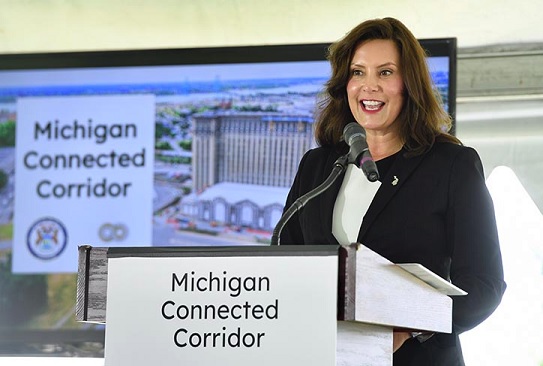ITSdigest
The State of Michigan announced plans to develop a corridor for connected and autonomous vehicles.
A key goal of the project will be to design the corridor with a focus on closing long-standing gaps in access to transit and transportation across the region.
"Here in Michigan, the state that put the world on wheels, we are taking the initial steps to build the infrastructure to help us test and deploy the cars of the future," said Governor Gretchen Whitmer.

Cavnue , a subsidiary of Sidewalk Infrastructure Partners (SIP) with a focus on building the future of roads, has been selected by the state to serve as Master Developer of the corridor project. This public-private partnership will explore the opportunity and viability of this project working with state and local partners, stakeholders, and communities across the corridor from Detroit to Ann Arbor.
Cavnue will work with the Michigan Department of Transportation (MDOT), the Michigan Office of Future Mobility and Electrification, the Michigan Economic Development Corporation, the Michigan Department of Labor and Economic Opportunity (LEO) and industry and local project partners throughout Phase One of the effort, expected to last approximately 24 months.
The vision for the corridor is intended to create lanes that are purpose built to accelerate and enhance the full potential of connected and autonomous vehicle (CAVs) and move people.
The project is designed to be "future proofed" and evolve to meet transportation goals, beginning with connected buses and shared mobility vehicles such as vans and shuttles, and expanding to additional types of CAVs such as freight and personal vehicles.
The project will advance key policy goals, including improving safety, achieving neutrality among vehicle OEMs through standards-based approaches, enhancing accessibility, affordability, and equity, and aligning with regional planning, thus encouraging innovation, R&D, economic development, open data access and shared learnings, cybersecurity, and replicability. Throughout the planning and development process, stakeholders will carefully evaluate potential impacts on the transportation workforce and ensure that it supports good-paying jobs.
The project envisions connecting Detroit and Ann Arbor along with key communities and destinations along Michigan Avenue and Interstate 94 in Wayne County and Washtenaw County with an innovative infrastructure solution that allows for a mix of connected and autonomous vehicles, traditional transit vehicles, shared mobility, and freight and personal vehicles.
The corridor includes up to a dozen Opportunity Zones, where expanded mobility will connect individuals, small businesses, and communities to Southeast Michigan's most important industrial, technological, and academic clusters. This includes leading test tracks, universities, automotive companies, and key economic anchors.
During the feasibility analysis in Phase One, work will focus on technology testing and roadway design, and exploring different financing models with an aim toward determining project viability from both a technology and business perspective. Subsequent construction and implementation would be part of future phases of the project, to be determined following the initial 24-month period.
Initial project partners include Ford Motor Company; the University of Michigan, with its CAV research center and world-class Mcity Test Facility, Transportation Research Institute (UMTRI), and facilities along the proposed corridor; and the American Center for Mobility (ACM), a leading testing facility.
Cavnue will develop OEM-neutral standards and technology for the implementation of the corridor and permit connected and autonomous vehicles meeting specified safety and other standards to operate on the corridor regardless of the vehicle manufacturer. In developing OEM-neutral standards for the implementation of the corridor, Cavnue will draw on an advisory committee of automotive and autonomous mobility companies, including Argo AI, Arrival, BMW, Honda, Ford, GM, Toyota, TuSimple, and Waymo.
"As the anatomy of vehicles continues to shift toward autonomous driving and electrification, Michigan has an opportunity to not only drive this evolution in the production of vehicles, but also in the very roads they drive on," said Trevor Pawl, Chief Mobility Officer of the State of Michigan. "This groundbreaking project reinforces Michigan's current position as a global leader in mobility innovation, and it also keeps us moving forward on a path to more equitable, safe and environmentally conscious transportation in the state."




